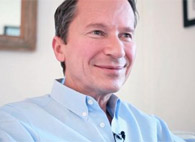Richard Socarides, a New York attorney who served as President Bill Clinton’s senior adviser from 1993 to 1999 in a variety of senior positions including advising the president on gay and lesbian civil rights issues, speaks about his coming out experiences to his father, Dr Charles Socarides, one of the founders of conversion therapy who believed homosexuality is a mental illness and can be cured.

The senior Socarides, who passed away at 83 in 2005, was the author of a half-dozen books about homosexuality which includes The Overt Homosexual (Grune & Stratton, 1968) and Homosexuality: A Freedom Too Far - A Psychoanalyst Answers 1,000 Questions About Causes and Cure and the Impact of the Gay Rights Movement on American Society
He said during a filmed lecture: >Homosexuality is in fact a mental illness which has reached epidemiological proportions.
He was also an outspoken critic of the American Psychiatric Association's 1973 decision to remove homosexuality from its list of mental disorders.
In an interview published by Imfromdriftwood.com, a site that "aims to help lesbian, gay, bisexual, transgender and queer people learn more about their community," Richard, 59, recalled that his father was initially angry when he first came out to him and a few months went by before he received a 4-page letter from his father. In the letter, he apologised for getting angry, expressed his desire for his son’s happiness and offered him support although he did not change what he was saying publicly about the treatment and cure of homosexuality.
Transcript of the interview:
He would occasionally ask me who I was dating and I would say, you know, try to avoid it. By the time I was in law school, all of my friends, most of my close friends knew. I was in therapy at the time and both my sister and my therapist said to me, they said, “Everybody who does this, you get to the other side and it’s great, right, everybody who does this, you come out to the parent, and even if the parent is a little weird at the beginning, they realize their relationship with their own flesh and blood, with their offspring is more important than this thing and they get over it.” And that I think is like a good rule for everybody. But I was suspicious, I said, “Hmm, I might be the exception to this rule.”
But finally one day I managed to come see him in the middle of the work day to see him at his office. I sat down and said, “Dad I think this is something we’ve known for some time together but I’m gay and we have to find a way to be more honest with each other about this.” And he had a tendency for the dramatic. He was angry, but he certainly wasn’t surprised and angry, and he was kind of a little surprised. So I kind of said, “I’m going to give you some time to think about it, to take this one in” and I left. It did not last a long time and it did not have a good ending, at that moment. And I just let it sit for a while.
A relatively short interval of a couple of months in which we didn’t speak to each other passed, and then he sent me a letter. He sent me a beautiful letter handwritten, 4 pages, in which he basically said, “I’m sorry I behaved so badly. I’m sorry I got angry. You’re the most important person to me in my life and I love you and the only thing that’s important to me is your happiness and if this is what makes you happy I want to support you and we’ll just figure out a way to manage it.
Now, that was a great moment, the letter was a great moment, but it was not always that easy going forward because he did not change what he was saying publicly about the treatment and cure of homosexuality.
When people ask me about my dad is, right, what is the first thing they say, “Did he ever try to cure you?” And it’s an obvious question and the answer is no. It literally never came up. He never once said to me, “I have an idea, I have this theory, and we can get you some help for this!”
So it was quite sad because as a kid I had a relationship that was terrific. There was a lot of warmth and affection between the two of us and we were never really able to, well, we never came close to rebuilding that. But we had a relationship that was built on honesty, authenticity, integrity, at least coming from me. So it was much better.
You know, my story is no harder nor easier than anybody else’s. It’s just my story. It is a little stranger than most. And it’s kind of like a, wow, so you know it’s just part of who I am.
